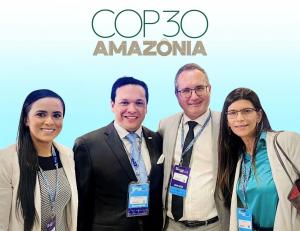Brazil Mobilizes Carbon Capture Subcommittee to Anchor COP30 Strategy
HOUSTON, TX, UNITED STATES, September 15, 2025 /EINPresswire.com/ -- As Brazil prepares to host the United Nations’ COP30, the Society for Low Carbon Technologies (SFLCT) is collaboratively involved in the country’s preparations as part of the Ministério de Minas e Energia (MME), a Brazilian government ministry, and its newly launched Carbon Capture, Utilization, and Storage (CCUS) Subcommittee, with participants shown in the opening image. This is particularly significant as Brazil enacted South America’s first carbon capture and storage (CCS) framework in 2024, which the SFLCT played a collaborative role in shaping, through the Fuel of the Future law, with Presidential backing.
What began at COP28, when SFLCT’s leadership facilitated engagement between Brazilian entities and the U.S. Department of Energy before the law’s passage, as featured in the "Journal of Petroleum Technology" (JPT), has now evolved into a deeper role. The Subcommittee, launched on July 14 under the Permanent Technical Committee on the Fuel of the Future, advances CCUS through Brazil’s Fuel of the Future law, anchoring the country’s stance at COP30 and beyond. Headquartered in the U.S., SFLCT operates from Panama to Pakistan, serving as a global bridge between international expertise and Brazil’s emerging CCUS framework.
At the Ministério de Minas e Energia’s public workshop on July 14, key stakeholders from the Subcommittee, including Petrobras, Instituto Brasileiro de Petróleo e Gás, TotalEnergies, FS Energia, Innovation Norway, and Empresa de Pesquisa Energética, came together to advance carbon capture policy and implementation.
The global NGO, also featured in JPT, is in direct dialogue with Brazil’s regulator, Agência Nacional do Petróleo, Gás Natural e Biocombustíveis (ANP), a participant of this Subcommittee. A key objective of this engagement is to support Brazil’s regulatory advancement on CCUS, recognizing that ANP, Brazil’s federal hydrocarbons and biofuels regulator, now holds notable authority over the carbon capture domain and its regulations.
This Subcommittee equally unites stakeholders across diverse sectors to ensure that Brazil’s net-zero commitments are backed by enforceable regulations and real-world deployment. During Rio Innovation Week, the following Subcommittee participants, tying back to the opening image, met after panel sessions hosted by the ANP: Cassandra Dewan, SFLCT Strategic Advisor; Fernando C. Hernandez, SFLCT Chairman of the Board; Carlos Cabral, MME; and Janaina Ruas Filiponi, SLB New Energy. Highlighting SFLCT’s growing international role, Hernandez noted, “At COP29 in Azerbaijan, we demonstrated our institutional prowess by engaging the World Bank to tackle Pakistan's smog and decarbonization. Brazil further extends the global south impact arc.”
As host nation, Brazil is home to South America’s first Direct Air Capture facility, visited by SFLCT and commissioned in late 2024. Petrobras has re-injected a record 14.2 million tons of CO2 offshore in the Santos Basin, representing nearly 28% of global CO2 storage capacity. While historically linked to Enhanced Oil Recovery (EOR), this milestone now signals Brazil’s technical maturity to move beyond EOR, laying the foundation for future projects focused on dedicated CO2 storage.
FS Energia’s ethanol-to-sequestration pilot, with oversight from ANP, marks the first well in Brazil for capturing CO2 and mirrors the pathway pioneered by Archer Daniels Midland in the U.S. in 2017, which is fully operational. Importantly, SFLCT brings institutional ethanol-to-sequestration expertise through advisory member Zach Liu, whose team at Harvestone Low Carbon Partners delivered the first CCS project at a U.S. ethanol facility in 2023 following the Inflation Reduction Act, offering Brazil a proven model.
Reflecting on the Subcommittee’s role, Hernandez stated, “This unified effort positions Brazil to present at COP30 how climate diplomacy can translate into regulatory clarity, financial innovation, and technical scalability.”
*Publishing note: The views expressed are those of Fernando C. Hernandez, Chairman of the Board of SFLCT, a U.S.-based non-profit (501(c)(3)), and do not necessarily reflect the positions of any organizations referenced. This information, constituting news, is provided solely for knowledge dissemination and non-commercial purposes. Portions of the opening image are used under U.S. fair use law, with the photo transformed to create new context and meaning, and the COP30 text excerpted for identification only. No endorsement or affiliation with COP30, its organizers, or participating governments is implied.*
Press Relations
Society for Low Carbon Technologies
+1 832-512-6155
email us here
Visit us on social media:
LinkedIn
Legal Disclaimer:
EIN Presswire provides this news content "as is" without warranty of any kind. We do not accept any responsibility or liability for the accuracy, content, images, videos, licenses, completeness, legality, or reliability of the information contained in this article. If you have any complaints or copyright issues related to this article, kindly contact the author above.


